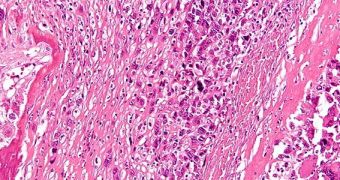One of the mechanisms that may be aiding cancer cells in their effort to dodge the effects of drugs administered during chemotherapy has been identified by scientists with the Cancer Center at the University of Colorado in Boulder (UCB). The team, led by expert Andre Thorburn, says that these cells often eat parts of themselves in order to increase their chances of survival.
This process, called autophagy (Greek for eating one's self), occurs in times of stress, such as those when dangerous drugs are threatening to kill off tumors. When this occurs in normal cells, the latter die off relatively fast. However, cancer cells appear to have developed a way of using this process to their advantage, customizing it so that they can recover and divide, rather than get destroyed.
Details of the new study appear in a recent issue of the esteemed journal Cell Reports and were also presented on Sunday, April 6, at the annual meeting of the American Association for Cancer Research (AACR), held April 5-9 in San Diego, California. The study team was led by Thorburn, who holds an appointment as the deputy director of the CU Cancer Center.
In his presentation, the expert said that autophagy is carried out by dedicated cellular organelles called autophagosomes. These structures bind to and encapsulate any extra or potentially dangerous material in cells and then transport their cargoes to dedicated disposal organelles in the cell, called lysosomes. This method is used to break down and remove cellular components that have outlived their usefulness.
Sometimes, the process is used to break these structures into their basic components, such as energy and proteins, which are later used for survival in situations were low energy levels are available to the cell. They are also put to good use when poisons or pathogens enter the cells.
“What we showed is that if this mechanism doesn’t work right, for example if autophagy is too high or if the target regulated by autophagy isn’t around, cancer cells may be able to rescue themselves from death caused by chemotherapies,” Thorburn explains, quoted by Science Blog.
He adds that the emergences of common markers of cell death following chemotherapy, such as those that start manifesting themselves during programmed cells death, or apoptosis, do not necessarily imply that the tumor cells will remain dead. His team found that highly-active autophagy enabled cancerous cells to release so many autophagosomes that all markers were annihilated and destroyed.
“The implication here is that if you inhibit autophagy you’d make this less likely to happen, i.e. when you kill cancer cells they would stay dead,” he goes on to say. What this means is that inhibiting autophagy locally, exclusively inside tumors, could make the latter more sensitive to chemotherapy.
“Autophagy is complex and as yet not fully understood. But now that we see a molecular mechanism whereby cell-fate can be determined by autophagy, we hope to discover patient populations that could benefit from drugs that inhibit this action,” Thorburn concludes.

 14 DAY TRIAL //
14 DAY TRIAL //